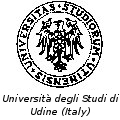Image credits:
Dense suspension of finite-sizeprolate ellipsoids settling in
still fluid. Authors: X. Jiang,
C. Xu, L. Zhao
Flyer:
Click here to download.Confirmed Keynote Speakers
Professor Francesco Picano
University of Padova (ITA)

Effects of particle inertia in turbulent suspensions
Abstract:
Particle suspensions are frequently present both in industrial applications and in environmental flows. In these contexts the typical flow velocity and length-scale are so high that inertial effects critically determine the dynamics with the flow usually turbulent. Dealing with suspensions constituted by small particles dispersed in a carrier fluid flow, the inertia at particle scale can play a non-trivial role altering the mass and momentum transfer with respect to a single-phase flow. Results from different datasets based on particle-resolved interface DNS will be considered in order to highlight these aspects. In particular, the effects of different particle features, such as size, density and concentration, will be discussed during the talk.
Brief Bio:
Presently, full professor of Fluid Dynamics at University of Padova since 2022, before associate professor in 2015 and Assistant in 2014. Since 2000, coordinator of the PhD program in Sciences, Technologies and Measurements for Space at University of Padova. The academic career started with a PhD in Theoretical and Applied Mechanics at Sapienza University of Roma, Italy in 2007, followed by some years as post-docs at Sapienza University and at Royal Institute of Technology, KTH Mechanics, Stockholm, Sweden, in 2011-2014. Research interests widen on physics and modeling of multiphase flows with application to environmental and industrial suspensions, turbulent sprays and respiratory flows. Fluid-structure interactions problems with solid breakup have been considered with application to porous media fracturing. More recently, phenomenologies and models concerning complex and/or compressible turbulent flows have been investigated. Around 80 papers have been published in high-quality journals on these topics. PI of many international computational projects and member of the Domain Panel - Engineering, Mathematics and Computer Sciences of EuroHPC for European computational research grants.
University of Padova (ITA)

Effects of particle inertia in turbulent suspensions
Abstract:
Particle suspensions are frequently present both in industrial applications and in environmental flows. In these contexts the typical flow velocity and length-scale are so high that inertial effects critically determine the dynamics with the flow usually turbulent. Dealing with suspensions constituted by small particles dispersed in a carrier fluid flow, the inertia at particle scale can play a non-trivial role altering the mass and momentum transfer with respect to a single-phase flow. Results from different datasets based on particle-resolved interface DNS will be considered in order to highlight these aspects. In particular, the effects of different particle features, such as size, density and concentration, will be discussed during the talk.
Brief Bio:
Presently, full professor of Fluid Dynamics at University of Padova since 2022, before associate professor in 2015 and Assistant in 2014. Since 2000, coordinator of the PhD program in Sciences, Technologies and Measurements for Space at University of Padova. The academic career started with a PhD in Theoretical and Applied Mechanics at Sapienza University of Roma, Italy in 2007, followed by some years as post-docs at Sapienza University and at Royal Institute of Technology, KTH Mechanics, Stockholm, Sweden, in 2011-2014. Research interests widen on physics and modeling of multiphase flows with application to environmental and industrial suspensions, turbulent sprays and respiratory flows. Fluid-structure interactions problems with solid breakup have been considered with application to porous media fracturing. More recently, phenomenologies and models concerning complex and/or compressible turbulent flows have been investigated. Around 80 papers have been published in high-quality journals on these topics. PI of many international computational projects and member of the Domain Panel - Engineering, Mathematics and Computer Sciences of EuroHPC for European computational research grants.




